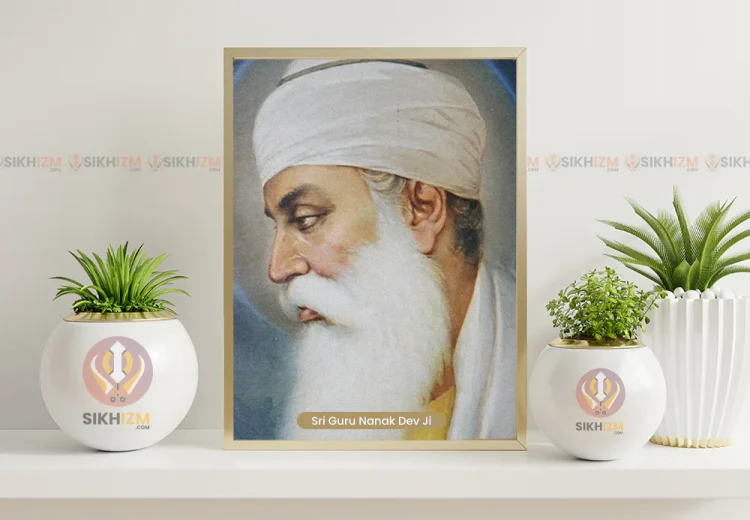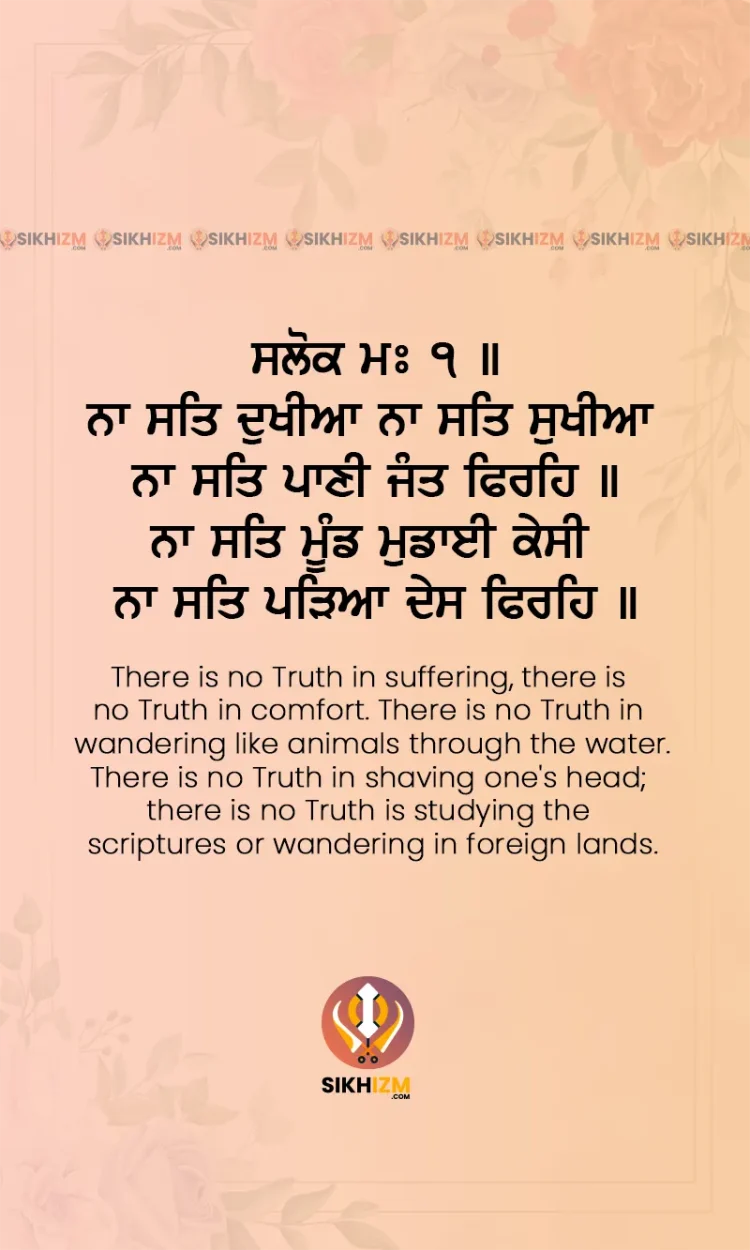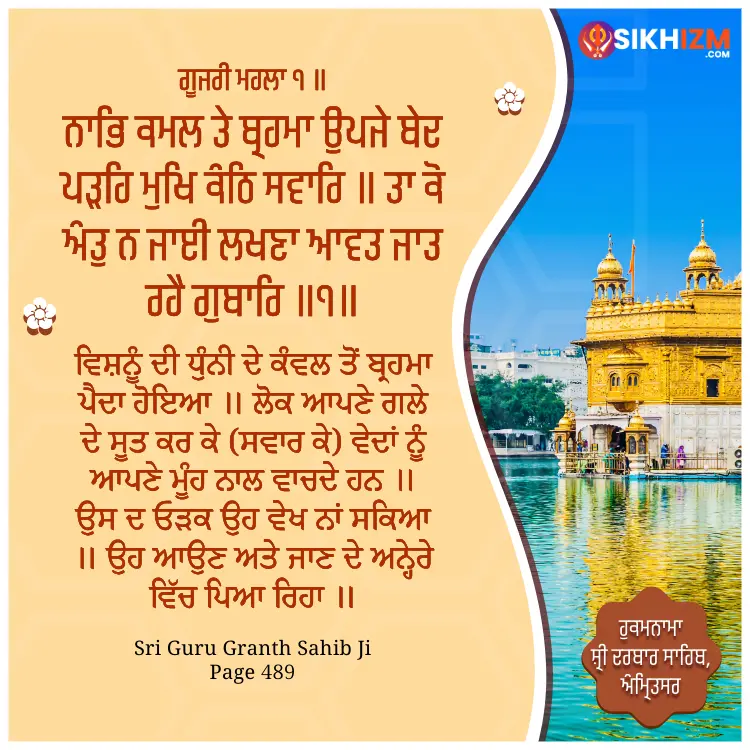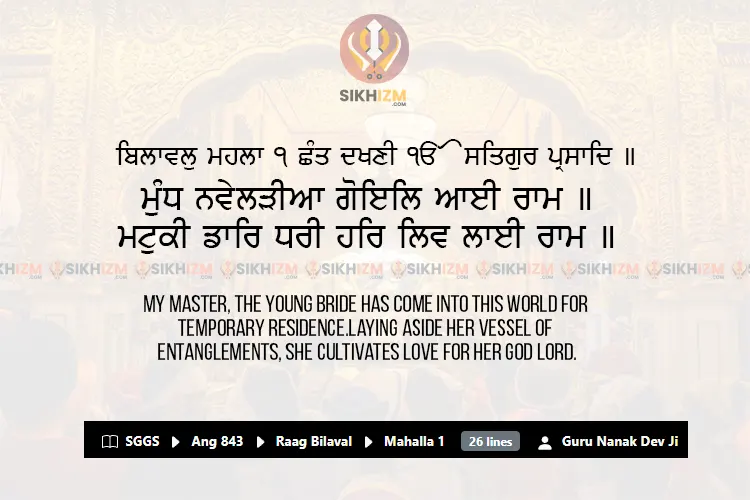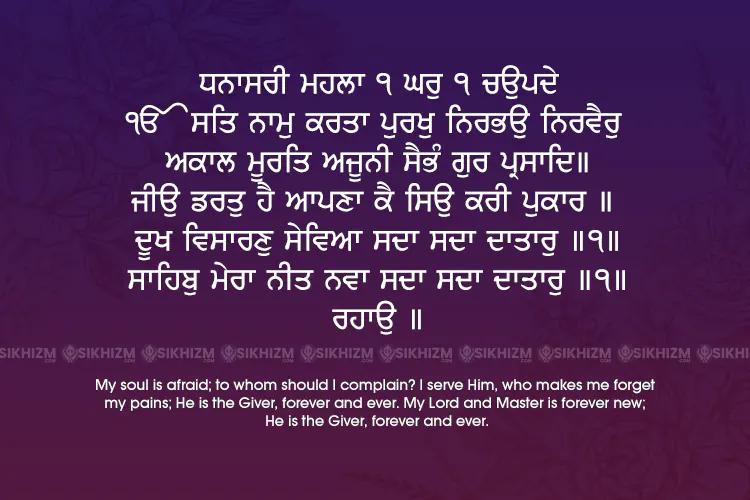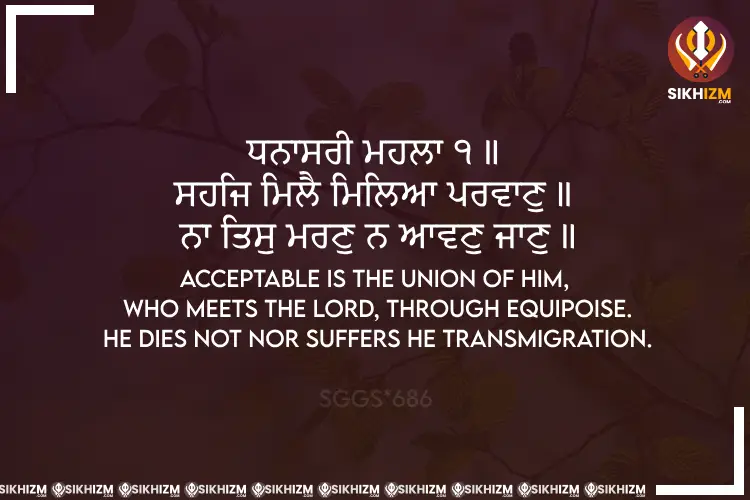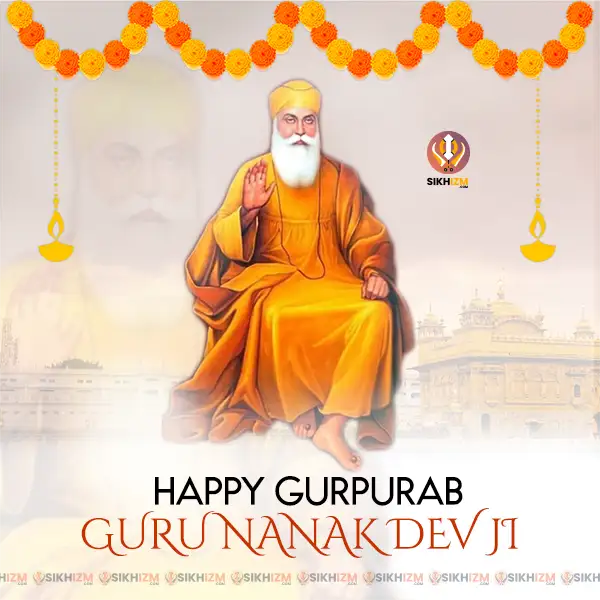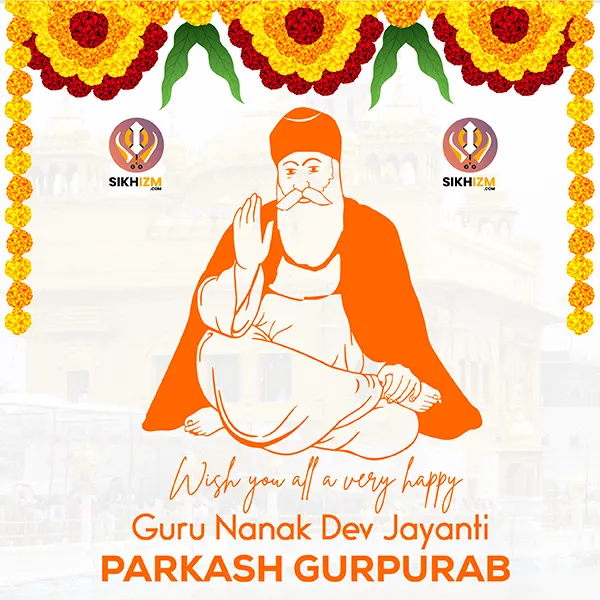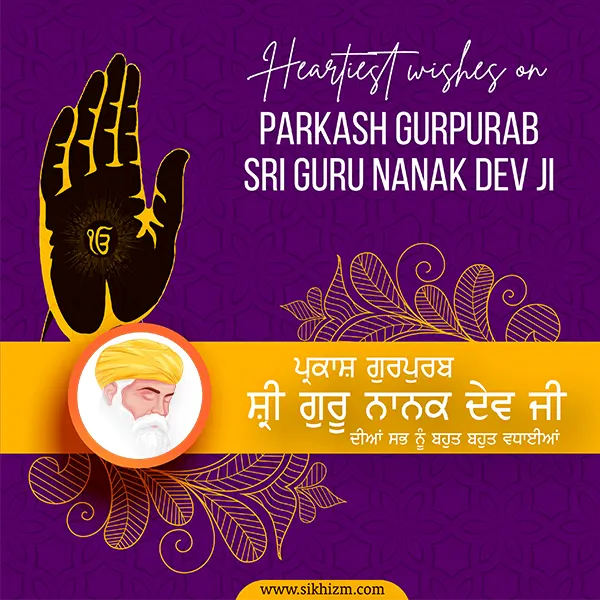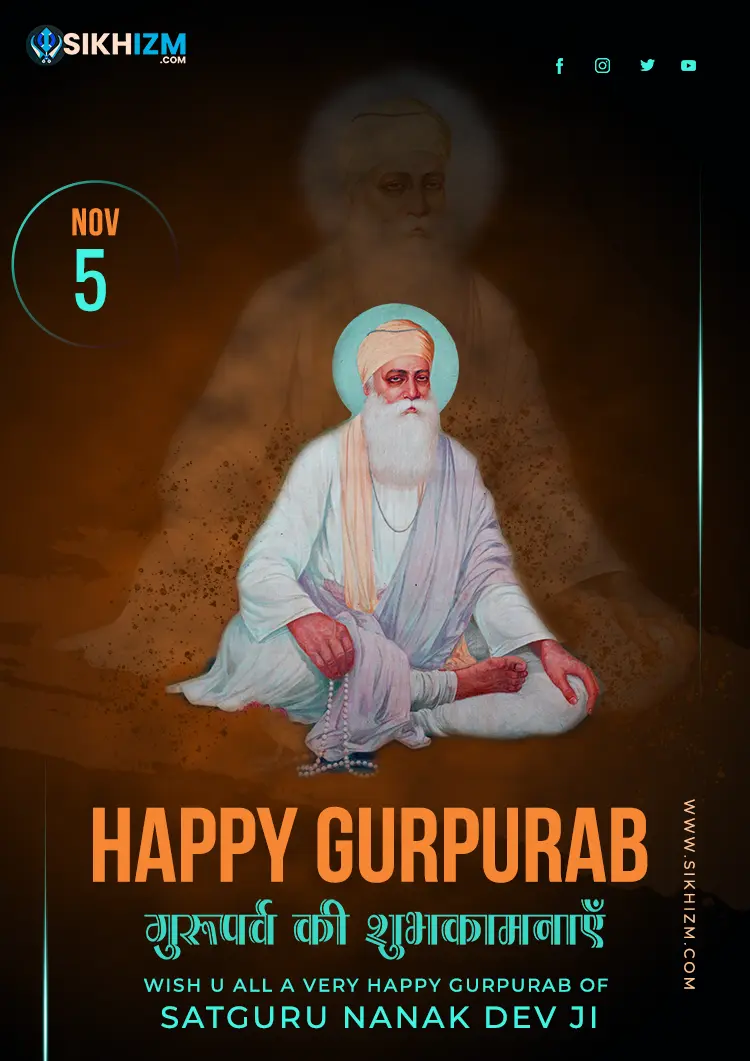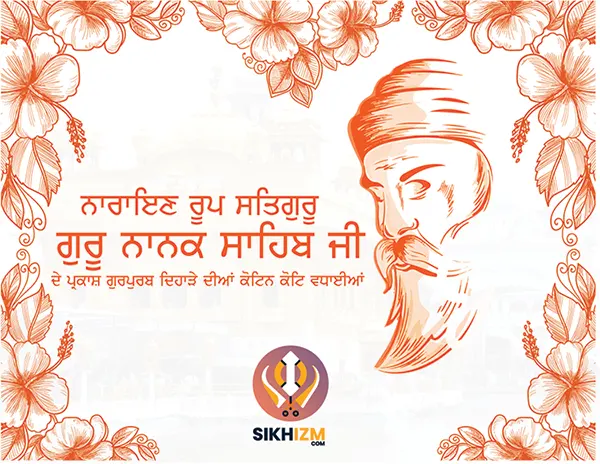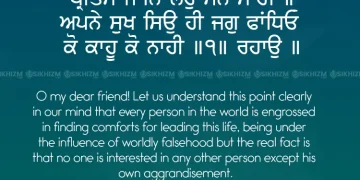Guru Nanak Dev Ji aka Baba Nanak
Sri Guru Nanak Dev Ji founded the Sikh faith. He proclaimed the divine word for the indivisible nature of God ‘Ik Oankar’ and gave the world a lofty “Mool Mantra”
| Name of Guru | Satguru Nanak Dev Ji, Bedi Linage which originated from the Son of Lord Rama – Kush. In Kush’s linage, there was Kaalket who recited Vedas in Kashi, and thereafter Bedi Vansh came to existence. |
|---|---|
| Birthplace | Rai Bhoin Di Talwandi, Sri Nankana Sahib |
| Birthday | 1526 Bikrami Kattak Sudi Poornmashi, 2 Gharis before Morning in Anuradha Nakshatra. The day was Wednesday, November 29th, 1469. (According to Damdami Taksal.) Now It is widely accepted that Guru Nanak Ji was born on the Poornmashi of Vaisakh, and Not in Kattak but in Traditions, we still celebrate the Birthday of Guru Nanak Dev Ji in Kattak. However, more recently Sikh Historian Harjinder Singh Dilgeer proved the hoax of Vaisakh wrong and concluded Kattak was the original Gurpurab. You can read this article – Real Date of Birth of Guru Nanak Dev Ji. |
| Parents | Mother Tripta Ji, Father Baba Kalyan Chand Ji aka Kalu Ji, Chacha Lalu aka Lal Chand Ji, Grandfather Shivram Das Ji, Grandmother Banarasi Ji, Great grandfather Baba Kalpat Rai Ji, Sister Nanaki who was 5 years older than Guru Nanak. |
| Spouse | Mata Sulakhni Ji belonged to Chona Gotra Village Pakho Ke Randhawe, Batala City. Married on Jeth 24th 1545 Bikrami. |
| Gurgaddi | From Birth |
| Joti Jot | 1596 Bikrami Assu Vadi Dasmi, Sri Kartarpur Sahib, 10th October 1539 |
| Children | Baba Sri Chand Ji Born on 1551 Bikrami, Baba Lakhmi Dass Ji Born on 1554 Bikrami |
| Total Age | 69 Years, 10 Months, 10 Days |
| Guruship Period | 69 Years, 10 Months, 10 Days |
| Throned King | Bahlol Lodhi (Father of Sikander Lodhi), Sikander Lodhi, Babur |
Short Biography of Guru Nanak Dev Ji
Guru Nanak Sahib Ji was Born at Talwandi, Nankana Sahib (Now in Pakistan). He traveled India’s North, South, East, and West including Arabia, Mesopotamia, Ceylon (Sri Lanka), Afghanistan, Burma, and Tibet for about 24 years, accompanied by Bhai Mardana (a Muslim) who played on the rebeck, while the Guru sang hymns in the praise of the Lord, imparting his teachings to the mankind.
He got married at the age of 18 and had two sons, Sri Chand and Lakhmi Das. While giving the definition of a True Muslim Guru Nanak said, Let compassion be your mosque, faith your prayer-mat, honest living your koran, modesty your circumcision, and contentment be your fast.
He gave us the practical religion of all mankind with the basic concept of love for all along with the motherhood and fatherhood of God for all mankind which could be practiced only through the guidance of a teacher, the Guru, the enlightener. He totally rejected the practice of observing rituals or penance and would sing his songs-celestial pining for the beloved lord and enjoying the conjugal bliss of the Lord-spouse all the time.
Finally, Guru settled at Kartarpur (Now in Pakistan) with his family and spent 15 years, earning his living as a farmer, later joined by Bhai Lehna Ji, who was anointed as his successor in 1539. His Bani is documented in 31 Raags in living Guru Sri Guru Granth Sahib Ji.
Table of Contents
Life Journey of Sri Guru Nanak Dev Ji
Guru Nanak Dev Ji Guru Nanak Dev JL, the founder of the Sikh religion and the first of a succession of ten Gurus, was born in 1469 AD at Rai Bhoi ki Talwandi, now called Nankana Sahib in Pakistan. His father, Kalyan Das Ji, more commonly known as Mahita Kalu was a Patwari i.e. village accountant, in the service of Rai Bular; the local Muslim chief, His father had a few acres of land of his own on which he raised cattle. His mother's name was Mata Tripta and had an elder sister Bibi Nanaki who loved her younger brother very much.
01
of 25True Education
Guru Nanak was a precocious and gifted child who at the age of five asked Questions about the purpose of life, and when sent to a Pandit to learn the alphabet, surprised his teacher by composing an acrostic poem with a deeply philosophical and mystic significance.
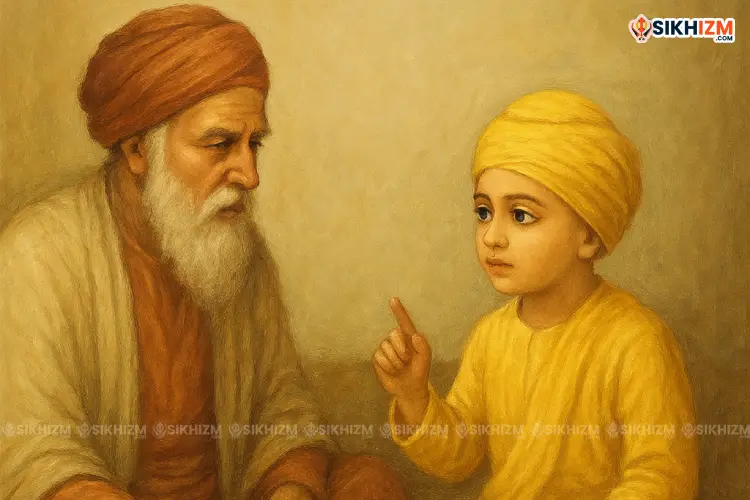
He narrated the meanings of the alphabet in the praise of God. The teacher was amazed at the keen intelligence of the child and commented, “Nanak is some apostle of God, some saint, who has come to show the path of virtue to mankind.”
02
of 25Shadow of the Cobra’s Hood on Guru Nanak Dev
His loving parents and sister were delighted to learn about his brilliance but were concerned by his laxness in the tasks of daily life, Once he was told to guard the fields against cattle and other animals. After making around two of the fields, he sat under the shadow of a tree and fell into meditation, In the afternoon, the shadows began to change.
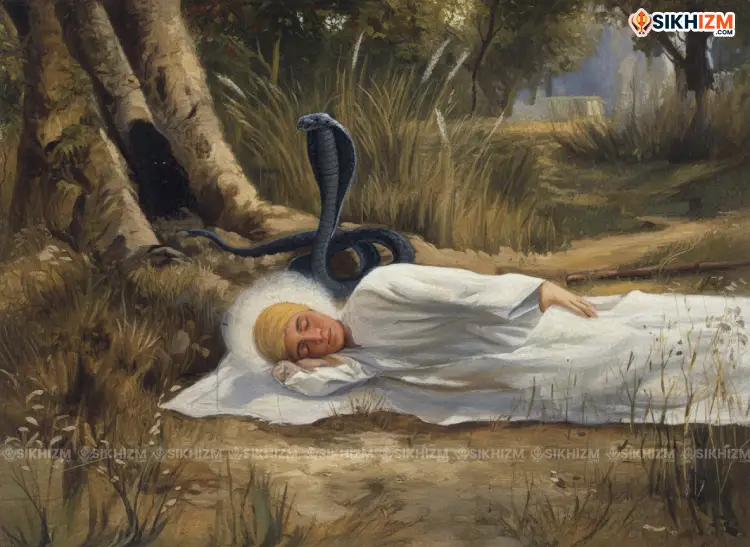
The village chief, Rai Bular passed that way and from a distance, he saw the child Guru lying under the tree. Though the sun was directly above him till his face was in shade. And the shade above Guru Nanak was not that of a tree, instead, Rai Bular saw a cobra with his hood lifted high, providing shade to the Guru. At the sound of men, the cobra disappeared into the fields and Guru Nanak also got up, with the name of God on his lips.
Rai Bular was now certain that Nanak was a great saint. He said to Mehta Kalu, “Your son is indeed a Divine person and this town lives through his blessings.” Guru Nanak let the cattle entrusted to his care, wander into a farmer’s field and trample his crop. But when the complaint reached the village chief, the fields were found intact on inspection.
03
of 25Guru Nanak Dev Ji rejects the sacred thread - Janeu
At the age of nine, a ritual ceremony of wearing the sacred thread Janeu was arranged by the family. On seeing the priest preparing the sacred thread, supposed to protect the religion, Guru Nanak said, “Pandit Ji ! if you have an unbreakable sacred thréad which can make a person kind, contented, and self-controlled, I shall certainly wear it. Prepare a sacred thread from the four virtues of pity, patience, self-discipline, and truth, I shall certainly wear it. Otherwise, I am not willing to go through the ceremony.” The Pandit and others present there had never heard such words of deep wisdom.
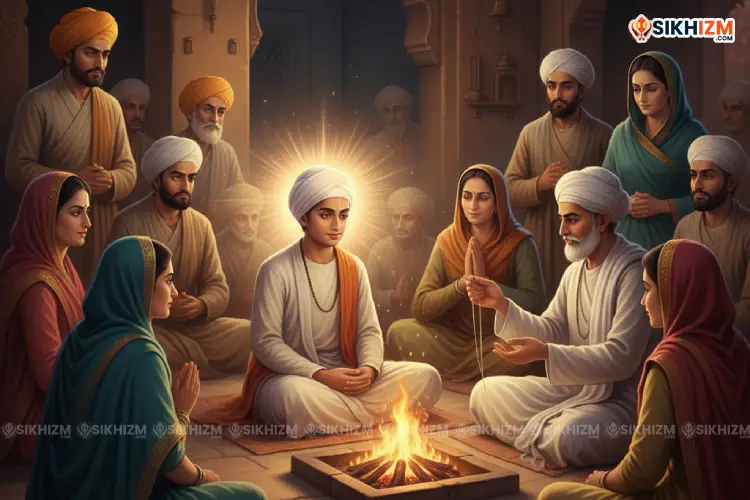
04
of 25Guru Nanak Dev with the Physician (Vaidya Hardas Ji)
From an early age; Guru Nanak was in continuous dialogue with the religious traditions and teachers of his time. He did not settle for the routine observance of rituals and rules. The family grew anxious that Guru Nanak was emotionally or physically ill. His father, Mehta Kalu summoned Hardas Ji, the physician, who examined the seemingly unyielding youth. The physician took Guru Sahib’s arm to feel the pulse, while Guru Sahib was lying on a cot. Guru Nanak pulled away his arm from the physician’s hand and said, “Dear physician! I have no bodily ailment, my real ailment is in my mind that is beyond your comprehension.
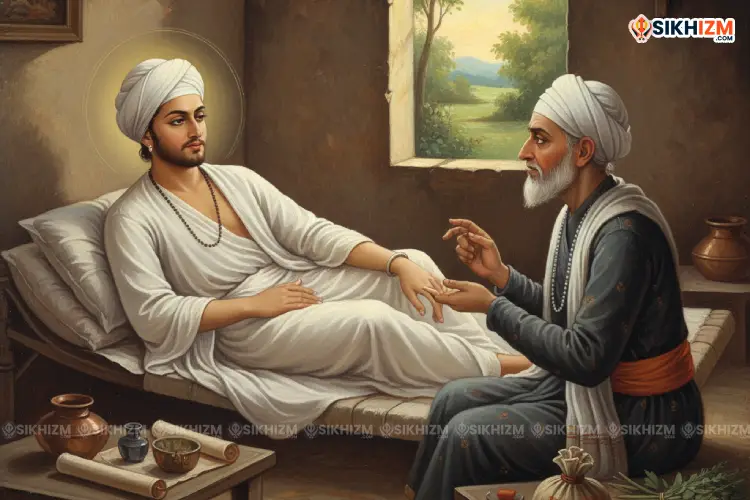
A physician who first recognizes the ailment correctly and then prescribes the medication to free the body from all ailments is a wise physician. You are not a real physician as you cannot treat your own malady before relieving me of my illness.” At this moment, the physician stopped the examination and asked, “I am quite healthy, tell me about my illness which you are talking about.” Guru Sahib replied, “You have a serious illness of cyclic birth and death, this cycle of birth and death cannot be cured by your prescribed medicines. The true physician is one who does not suffer from this disease and he only can cure others. The Almighty Lord is the true physician who neither takes birth nor dies.” The physician concluded that Guru Nanak had no need for healing, but was set for the healing of many.
05
of 25True Bargain - Sacha Sauda
Guru Nanak was often lost in thought and in deep meditation. He showed no interest in worldly things. His parents wanted him to lead a worldly life and therefore, married him to Bibi Sulakhni. But the things didn’t make much difference.

His father, Mehta Kalu thought of sending his son to the nearby town to purchase items for the shop, so that he feel interested in business. He gave twenty rupees to Guru Nanak and told him, “Go to Chuharkhana with a companion and buy some articles, which can bring some profit.” While passing through a thick forest along the way, Guru Nanak met some Sadhus. He came to know that they had been without food for many days. He thought, “I was asked to make a profitable bargain.
These hermits are so hungry, could there be a better deal than to feed them with the money given to me.” He hurried to Chuharkhana and bought the necessary items for the Sadhus with the money. The hermits ate the food and accepted the clothes offered by Guru Nanak. The hermits thanked Guru Nanak for the Sevaand Guru Nanak advised them to leave the forests and return to their households. The hermits agreed to it.
This was the True Bargain (Sacha Sauda) done by Guru Nanak with twenty rupees. It is worth noting that twenty rupees of that time are equivalent to thousands (or lacs) of rupees today. Guru Sahib, not only provided food and clothes for the hermits but also gave monetary assistance to them, so as to relieve them of the hardships of life and make them return to their households.
06
of 25Guru Nanak Dev Ji at Modikhana
An invitation came from Guru Nanak’s sister Nanaki and her husband Bhai Jai Ram for him to stay with them in Sultanpur. Despite the sorrow of Mata Tripta at the departure of her son, there was hope that this new setting would energize Guru Nanak to practical life. Guru Nanak gained employment as keeper of the Modikhana, a government storehouse, in Sultanpur, from Nawab Daulat Khan Lodhi. He fulfilled his duties and people who came for the provisions were satisfied with his good work. He distributed his own rations too among the needy, keeping for his needs only a small quantity.
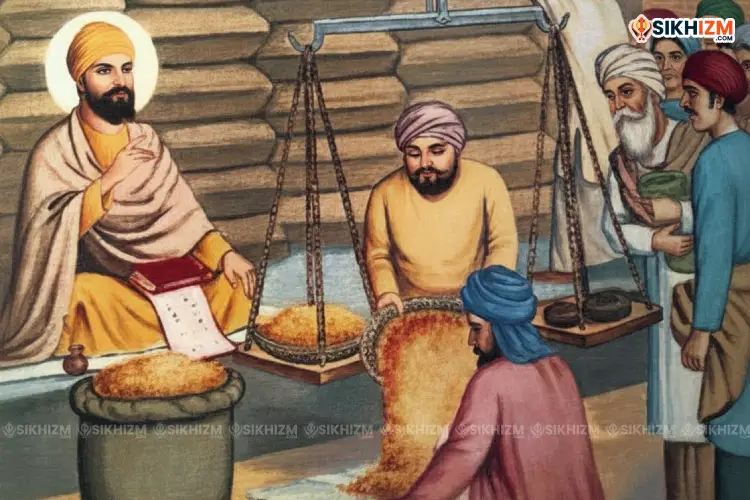
Once, as Guru Nanak was weighing the provisions, he got stuck at the number 13 (Tera) as Tera in Punjabi means Yours. And he started repeating - Tera, Tera..... The people coming to collect the provisions thought that it was meant for them. On seeing Guru Nanak distributing the provisions while reciting His name ‘Tera, Tera...’ and without properly weighing them, someone reported the matter to the concerned authority. They feared heavy losses in the store. Guru Nanak was summoned to the court and asked for an explanation.
The accounts of the store were checked but it was found to be proper without any mistake and the quantity of material in the store was also matched. Seeing this, Guru Nanak said, “This is all in God’s will. He has himself done it. It is He who provides everything to us and it is only He who takes care of us.” Na Ko Hindu Na Musalman" Guru Nanak gathered a group of disciples for the worship of one God and meditation on the divine Name. A Muslim minstrel, Bhai Mardana (1459- 1534) joined him at Sultanpur, where they organized the singing of hymns, the sharing of a common meal, and urging people to a life of simplicity and righteousness. Bhai Mardana accompanied Guru Sahib by playing on Rebeck (Rabab) when the latter used to sing the glory of God in the form of Kirtan.
Guru Sahib’s family - wife and two sons (Baba Sri Chand and Lakhmi Das) also joined him in Sultanpur. One day Guru Nanak failed to appear for work following his early morning ablutions in the River Vein (ਵੇਈਂ) which flowed past the town of Sultanpur. He had been missing for three days and nights, and it was feared that he had drowned. Rapt contemplation of God had brought him to intimate communion with the Divine. He seemed to have received a call to go forth into the wider world to preach the vision bestowed to him.
The Puratan Janam Sakhi describes this mystical experience in terms of a direct encounter with the Divine; also Bhai Gurdas Ji, who says in Var 1, Pauri 24 that Guru Nanak was invested with his commission in Sach Khand, the Abode of the Eternal One. f The first word that Guru Nanak uttered on reappearance was: “Na ko Hindu Na Musalman - There is no Hindu, there is no Musalman.” He announced to the world the good news of life lived in communion with the one God who is beyond the religious divisions created by humankind.
07
of 25The Qazi, Nawab and Guru Nanak (during Namaz)
Guru Nanak said, “All men are equal and they are judged not by their family, creed, caste or birth, but by their deeds.” On hearing such words, the Qazi complained to the Nawab, “Nanak misleads the people by saying that we are neither Muslims nor Hindus. His views are wrong as one who performs Namaz and believes in Allah is surely a Muslim.” The Nawab sent a representative to Guru Nanak for inviting him to offer the evening Namaz with him. Guru Sahib accepted the offer and they gathered in the mosque to offer Namaz in the evening. Guru Nanak, however, stood apart watching the Qazi and the Nawab offer their prayers.
At the end of the Namaz, Qazi asked, “Why did you not join us in the Namaz ?” The Guru replied, “While praying, you were all the time worried about the safety of your newborn cult. You were afraid that it might fall into the well. With whom was I to offer the prayer ?” The Qazi was much ashamed and said, “But then you could have offered Namaz with the Nawab Sahib.” “The Nawab was busy buying horses in Kabul”, said the Guru. The Nawab also admitted that while offering prayers, his mind was roaming in the horse market of Kabul. The people present there were wonder-struck and exclaimed, “He is a Divine Being who can read people’s minds!”
08
of 25Travels of Guru Nanak - Udasis
Guru Nanak had received his message of Shabad and now was ready to share it with the world. The true message has now been revealed to Him. Guru Sahib was now thirty years of age. Leaving his family behind and taking Bhai Mardana with him as his sole companion, he left Sultanpur for twenty years of traveling. His travels are grouped into four lengthy journeys (Udasis) to the east, south, north, and west.
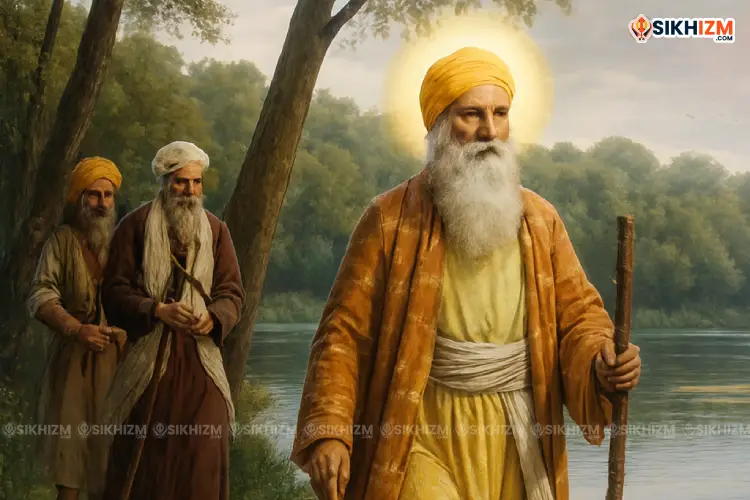
At the end of each, he returned to Punjab. While his travels took him also to many lesser-known destinations, Guru Sahib traveled as well to the pilgrim centers of different religions. His dialogue with Pandits, Sadhus, and Yogis of every sect, as with Mullas, Pirs, and Qazis, was not that of an uncommitted seeker, but that of a teacher.
09
of 25Bhai Lalo and feast of Malik Bhago
Setting out on his travels, Guru Nanak visited Saidpur, the present-day town of Eminabad in the Gujranwala district of Pakistan. There lived Bhai Lalo, a carpenter by profession, with whom Guru Sahib put up for three days. Bhai Lalo served him with devotion. That was the time when the Hindu administrator of the local Muslim chief, Malik Bhago had announced a grand feast to which all caste Hindus and saints and Sadhus of all religions in town and the vicinity were invited. At the end of the feast, a report reached Malik Bhago that Guru Nanak, a holy man had ignored his invitation and had instead chosen to dine with a low-caste carpenter. Messengers were immediately sent to bring Guru Nanak to his house.
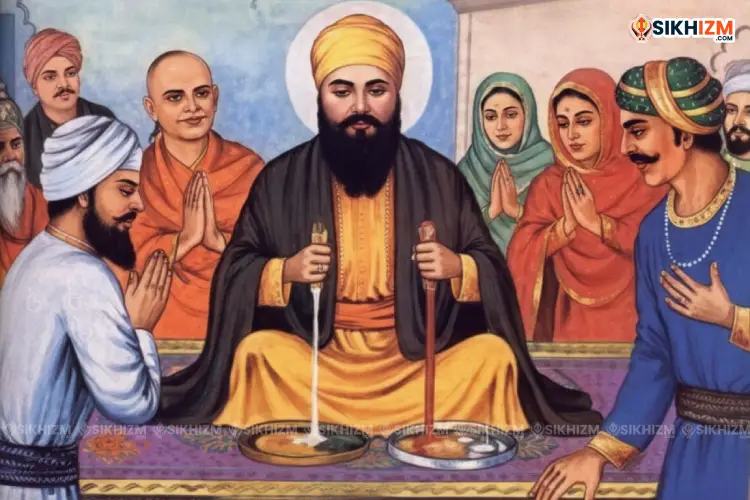
As Guru Sahib arrived, Malik Bhago spoke to him in resentful tones: “How is it that you ignored my invitation to the Brahm Bhoj (feast in honor of Brahmins and other holy men)? Or, is it that the food your casteless host serves you is better than mine?”
Guru Nanak said, “I eat what God sends. There are no castes in God’s sight.” “Then, you should eat whatever is offered in this house.” Splendid food items were there upon being summoned from his kitchen.
At the same time, Guru Nanak called Bhai Lalo, who followed him to Malik’s mansion, to bring food from his house. Guru Nanak took Bhai Lalo’s coarse bread in his right hand and Malik Bhago’s delicacies in the left. As he pressed both, milk dripped from Bhai Lalo’s coarse bread and blood from Malik Bhago’s delicacies. The entire assembly was lost in amazement.
Guru Nanak said to Malik Bhago, “The coarse bread is the fruit of honest labor. Though its owner is poor, it contains milk which is life-giving like nectar. Your rich preparations are no doubt tasty, yet they come from the blood of the poor. You have amassed your wealth through cruelty and tyranny by way of exploiting others’ toils, that’s why blood drips from your dish. You must live by your honest work. Charity given out of ill-earned money brings no blessings. I love honest workers, whether rich or poor, who live on their own toil.” After this event, Guru Nanak left Saidpurto to travel to far-off places, spreading the message of God.
10
of 25Guru Nanak Dev Ji's visit to Haridwar
Guru Nanak reached Haridwar, where countless pilgrims had gathered for the holy dip in the River Ganges. On the banks of the river, Guru Sahib noticed that people, while bathing, were offering water towards the East, to the rising sun.
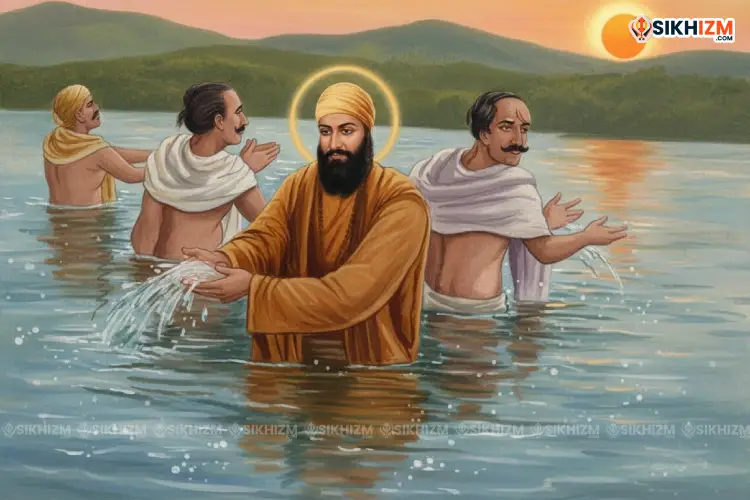
Guru Sahib, too, stood in the water and with his back towards the sun, began to splash water in the western direction. Seeing the resentment of the people, Guru Sahib asked them the reason for splashing water towards the East. They replied, “We are offering water to our ancestors, now living in the upper world, the land of the sun.”
Hearing the reply, Guru Sahib resumed his westward offering of water and said, “I am pouring water to my fields in Punjab.” At this, the people laughed and said, “How is it possible? The water you pour falls into the Ganga itself. How can it reach your fields?
Guru Sahib turned to them and asked, “How far is the land where your forefathers now live?” A clever one among them replied, “A few crores of miles.”
Guru Nanak said, “If my offering of water cannot reach my fields which are only a few hundred miles from here, how can your ancestors receive your offerings when they are crores of miles away?”
The gathering was silenced. Guru Sahib came out of the water and addressed the gathering, “My friends! do not be misguided by false beliefs. Water, food, or money that was given by you for the use of ancestors in the other world can’t reach them by no means. Everyone gets the fruit of one’s own actions.”
11
of 25The Real Purity as per Guru Nanak's teachings
At Haridwar only, some Sadhus were preparing food. Guru Sahib observed that the Sadhus had drawn a demarcation line around the kitchen so that nobody makes the food impure by crossing the line.
Seeing this demarcation line in the kitchen Guru Sahib said, “This kitchen is already impure, the line drawn by you is useless. When you entered the kitchen, you were accompanied by four low-born people.” All of them looked around for those persons, but could not find any and asked Guru Sahib to whom he is referring.
Guru Nanak said, “Scavengers, butchers, skinners, and Marasis are the low-caste persons whose touch is supposed to pollute you. But your evil-thinking, unholy life, ill talk, and cruelty are no less degraded than the so-called low castes, and they are your constant companions who always reside within you.
Until you get rid of these evil companions and have a pure heart, the kitchen will remain impure. The daily bath and applying sandalwood on the forehead do not purify a person. They alone are pious who possess pure hearts, imbibe noble thoughts, and remember ever the Great Creator.” Guru Nanak Dev Ji dispelled the false thinking of the people through his teachings.
12
of 25Strange Boons of Guru Nanak Dev Ji
During the course of their travels, Guru Nanak and Bhai Mardana reached a village where its inhabitants cared only for enjoyment and fun. They made fun of Guru Sahib and offered them no shelter or food. They were arrogant people who would listen to no good advice. While leaving the village, Guru Sahib said, “May you continue to thrive here.” A few miles further on, they reached another village whose inhabitants were very hospitable and good. They greeted the guests and served them respectfully. People were of charitable nature, loving, and kind-hearted.
Guru Sahib stayed in the village for a night. While departing, Guru Sahib blessed them with the words, “May God uproot you.” On hearing this, Bhai Mardana surprisingly asked Guru Sahib, “You have done strange justice. People who maltreated you were blessed by you. And the kind-hearted inhabitants of the village have been cursed with ruination.”
Guru Nanak said, “The inhabitants of the previous village will spread evil and wicked ways wherever they go. So it is good if they continue to live there only. Whereas people of this village will teach wisdom, kindness, and truth, wherever they go. It is therefore good if they leave their village and spread themselves to other places too.”
Bhai Mardana, struck by this wise utterance, exclaimed, “It is not possible to fathom the greatness of your mind.”
13
of 25The True Worship - Aarti as per Guru Nanak Dev
Guru Nanak reached Jagannath Puri, the land of temples on the sea coast in Orissa. There they saw the famous car- procession where people were dragging a giant sixteen-wheeled chariot of stone, in which was placed a figure of the Lord Jagannath. In the evening, worship (Arti) of the Lord was to be held in the temple.
Countless lamps were burning. Silver and gold plates studded with jewels, flowers, and incense were arranged for the prayer. Devotees moved the huge fans on their Lord and sang devotional hymns in sweet tones by ringing the bells. The priests invited Guru Nanak to join the Arti of the Lord. Guru Ji replied, “The figures made by human hands can in no way be called Jagannath or The Lord of the Universe. The Formless One alone is the Creator. No human hands can ever create Him. And the worship (Arti) of the Divine Being proceeds eternally, it is going on. It is there for you to see if you so desire.”
The priests asked in surprise, “How is the Arti going on eternally without anyone performing it ?” Guru Sahib recited the holy verses while Bhai Mardana played the Rabab:
ਧਨਾਸਰੀ ਮਹਲਾ ੧ ਆਰਤੀ ੴ ਸਤਿਗੁਰ ਪ੍ਰਸਾਦਿ ॥ ਗਗਨ ਮੈ ਥਾਲੁ ਰਵਿ ਚੰਦੁ ਦੀਪਕ ਬਨੇ ਤਾਰਿਕਾ ਮੰਡਲ ਜਨਕ ਮੋਤੀ ॥ ਧੂਪੁ ਮਲਆਨਲੋ ਪਵਣੁ ਚਵਰੋ ਕਰੇ ਸਗਲ ਬਨਰਾਇ ਫੂਲੰਤ ਜੋਤੀ ॥੧॥ ਕੈਸੀ ਆਰਤੀ ਹੋਇ ਭਵ ਖੰਡਨਾ ਤੇਰੀ ਆਰਤੀ ॥ ਅਨਹਤਾ ਸਬਦ ਵਾਜੰਤ ਭੇਰੀ ॥੧॥ ਰਹਾਉ ॥ ਸਹਸ ਤਵ ਨੈਨ ਨਨ ਨੈਨ ਹੈ ਤੋਹਿ ਕਉ ਸਹਸ ਮੂਰਤਿ ਨਨਾ ਏਕ ਤੋਹੀ ॥ ਸਹਸ ਪਦ ਬਿਮਲ ਨਨ ਏਕ ਪਦ ਗੰਧ ਬਿਨੁ ਸਹਸ ਤਵ ਗੰਧ ਇਵ ਚਲਤ ਮੋਹੀ ॥੨॥ ਸਭ ਮਹਿ ਜੋਤਿ ਜੋਤਿ ਹੈ ਸੋਇ ॥ ਤਿਸ ਕੈ ਚਾਨਣਿ ਸਭ ਮਹਿ ਚਾਨਣੁ ਹੋਇ ॥ ਗੁਰ ਸਾਖੀ ਜੋਤਿ ਪਰਗਟੁ ਹੋਇ ॥ ਜੋ ਤਿਸੁ ਭਾਵੈ ਸੁ ਆਰਤੀ ਹੋਇ ॥੩॥ ਹਰਿ ਚਰਣ ਕਮਲ ਮਕਰੰਦ ਲੋਭਿਤ ਮਨੋ ਅਨਦਿਨੋ ਮੋਹਿ ਆਹੀ ਪਿਆਸਾ ॥ ਕ੍ਰਿਪਾ ਜਲੁ ਦੇਹਿ ਨਾਨਕ ਸਾਰਿੰਗ ਕਉ ਹੋਇ ਜਾ ਤੇ ਤੇਰੈ ਨਾਮਿ ਵਾਸਾ ॥੪॥੧॥੭॥੯॥
(SGGS, pg. 663)
All present there listened to the noble Shabad of True Arti and praised the greatness of the Guru.
14
of 25Reformation of Kauda Ogre (Rakshasa)
Guru Nanak and Bhai Mardana arrived in the land of the Bheels (tribe). The Bheels were pitch dark in color, had blood-shot eyes, and wore animal skin on their bodies. They lived by hunting wild animals and eating wild fruits.
Kauda, the man-eating Savage caught Bhai Mardana who went a little away into the forest, all alone. It was the usual practice of Kauda to catch lonely travelers, whom he kept prisoner with tied hands and feet for some days, and then kill them for the purpose of eating.
When Bhai Mardana did not return after a long time, Guru Nanak reached there in search of him. Seeing the Guru’s divine face, Kauda trembled with a sense of guilt as he had not seen such a noble expression on anyone’s face before. His cruel heart melted.
Guru Sahib said, ‘My friend ! where is my companion? I want him back.”
Kauda at once untied Bhai Mardana and brought him before the Guru. Guru Sahib advised Kauda to give up robbing and killing people and to earn his living through honest labor. Kauda promised not to kill anyone and to follow the teachings of the Guru.
After visiting many places, Guru Sahib returned to Talwandi and stayed there for some period with his family. After the stay in Talwandi, Guru Sahib again set out to carry the message of truth and holiness to a world full of sin and ignorance.
15
of 25Meeting the Sidhas on Mount Sumer
Passing through Kashmir and traversing the steep mountains and long tiring footpaths, Guru Nanak reached Mount Sumer, which was the abode of many sadhus and yogis. As the mountains were almost inaccessible, the yogis living there were surprised to see Guru Sahib and asked, “What power has helped you in reaching this distant place?”
“I have thought of God alone always and worship Him with utter love and reverence. That power has led me here,” replied the Guru. He further said, “When great souls like you have left the world and are hiding here, who would save mankind and lead the ignorant to the right path?” Guru Sahib advocated family life and social commitment.
The Sidhas-Yogis performed miracles with their magical powers. They asked Guru Nanak to fetch a bucket of water j from the nearby pool. But with their powers, they converted the water into pearls and rubies.
Guru Sahib realized their trick to trap him through temptations. He returned without filling the bucket and said that the tank was without water. When the Sidhas - Yogis saw that pearls and rubies could not even tempt him, nor could any magical powers lay any impact upon him, they bowed before the Guru. Guru Nanak had a long conversation with the Sidhas and all their queries were answered by Guru Sahib.
16
of 25Sajjan, the Thug and Guru Nanak
Guru Nanak and Bhai Mardana, in the course of their travels, reached a town called Tulambha (now in West Pakistan). On the path leading to the town, there were fine places of worship - a temple for the use of Hindus and a mosque for the Muslims. Besides this, there were good rooms where pilgrims were lodged for a comfortable stay by Sheikh Sajjan.
Sajjan use to serve the travelers very well and at the night, he would kill them, take all their belongings and throw the dead bodies in the secret well beneath the rooms.
Guru Nanak and Bhai Mardana reached the place where Sajjan stood wearing milk-white clothes, looking very much like a gentleman. On seeing Guru Sahib, Sajjan thought that a rich man had arrived along with his servant, who must have dressed as a Sadhu to escape suspicion from the thieves. Sajjan welcomed them, led them in, and served them respectfully.
Before retiring at night, Guru Nanak recited a Shabad(hymn) while Bhai Mardana accompanied him on Rabab. Guru Sahib said in the verses, “A life of virtue and truth is superior to one of wickedness and falsehood. The internal purity of mind is more charming than external beauty. Sajjan (good man) is one who is ever ready to help others in distress. The fine decorative works on the palaces are deceptive as they are hollow from the inside. The milk-white stork stands in the middle of the pool, killing and eating fish, in reality, it is not white or pure. Deceived by the size of the Simmal tree, the birds make their nest on it, but its fruits are useless. The man, who is blind, carries a heavy burden, the way is long and difficult, and being blind he cannot see the ' way. Noble deeds, virtues, and worship of the Divine Beingrelieve one from all evils.”
Hearing the verses, Sajjan stood up and fell at the Guru’s feet, saying to himself, “All these verses are applicable to my own life and deeds. This great man knows all my past misdeeds, he can in reality look within others.” Sajjan begged forgiveness for his faults and confessed all his crimes. Guru Sahib advised him to return the looted property in respect of persons whose names and places he knew, and also pull down the huge mansion which has been built with the earnings of sin. Sajjan obeyed the master and became a changed man, engaged in noble life and Divine worship.
17
of 25A Visit to Mecca by Guru Nanak
Guru Nanak set out for Mecca, the holy place of Muslims in Arabia, where they go for pilgrimage (Hay). After a long journey, completed partly on foot and partly on camelback, Guru Sahib reached there after many days. At night, Guru Sahib lay down for rest in the holy walk around the shrine and fell asleep with his feet towards the Qaba or the Holy Temple.
A Muslim pilgrim, finding the Guru thus asleep, flew into a rage and said, “Who are you, and why are you lying with your feet towards the House of Allah?” Soon a crowd of people gathered there. Guru Sahib said humbly, “Brother! tell me in which direction God does not live.” With these words, a new light dawned on man - God lives everywhere, He lives in no particular place.
The pilgrim Hajis asked Guru Sahib, “Whether Hindu is great or the Muslim?”. Guru Sahib replied, “Without good deeds, both will have to weep and wail, and also only by being a Hindu or a Muslim, one cannot get accepted in the court of the Lord.”
ਪੁਛਿਨ ਖੋਲਿ ਕਿਤਾਬ ਨੂੰ ਵੱਡਾ ਹਿੰਦੂ ਕਿ ਮੁਸਲਮਾਨੋਈ। …
ਬਾਬਾ ਆਖੈ ਹਾਜੀਆਂ ਸ਼ੁਭ ਅਮਲਾਂ ਬਾਝਹੁ ਦੋਨੋ ਰੋਈ। (Bhai Gurdas Ji, Ver 1, Pauri 33)
18
of 25Enlightenment to the Pir of Baghdad
From Mecca, Guru Nanak and Bhai Mardana reached Baghdad, a big city in the country of Iraq. Staying on the outskirts of the city, Guru Sahib gave a traditional holy call for prayers which surprised the people as they had never heard such a sweet and devoted call to prayers before. The local Pir came and inquired about Guru Sahib and the sect to which he belong. The Pir put several questions before the Guru, asking particularly whether God looks upon Hindus or Muslims as better. Guru Sahib replied, “Superiority depends not on religion, but on good deeds.”
Guru Sahib answered many other questions to remove the Pir’s doubts on many points. The Pir however doubted the Guru’s assertion that there are countless nether- worlds and upper worlds. Guru Sahib enlightened the Pir about the existence of countless such worlds. Guru Sahib placed his hand on the forehead of Pir’s son and asked the boy to close his eyes. Instantaneously thousands of lower and upper worlds became visible to the boy’s inner eyes. When the boy narrated all that he had seen in the brief moment of the inner vision, everyone present touched the Guru’s feet in reverence.
19
of 25The Pride of Wali Kandhari Humbled
On his way back to Punjab, Guru Nanak and his companion Bhai Mardana arrived at a place called Hasan Abdal, now in West Pakistan. They halted at the foot of a hill. On the top of the hill lived a Muslim recluse known in those parts as Wali Kandhari. Feeling fatigued and thirsty, and seeing no water in the vicinity, Bhai Mardana climbed up to the Wali’s hut and asked for water to quench his thirst. Questioned as to who he was and what had brought him to that place, Bhai Mardana said that he was a musician and had come in the company of a great saint, Baba Nanak. Wali Kandhari refused to give him water and quipped instead that if his master was so accomplished a saint, he should not let his follower go thirsty.
Bhai Mardana walked back disappointed and told the Guru what Wali had said. Guru Nanak asked Bhai Mardana to go once again and supplicate Wali with humility. Bhai Mardana obeyed but returned only to report the failure of his mission.
Guru Nanak thereupon touched the hillside with the tip of the stick he was holding. Instantly, water spouted forth from that point and Bhai Mardana drank his fill. But simultaneously Wali Kandhari’s reservoir on top of the hill began to recede and soon dried up. Wali, blind with rage, rolled down a big boulder towards the travelers. Guru Sahib gently raised his arm and the rocky mass, as goes the tradition, stopped in its downward career as it came in touch with his palm (Panja, in Punjabi). The impression of his palm was left on the stone which is still shown to the visitors to the place, now famous as Panja Sahib, the Holy Palm.
20
of 25Babar’s Invasion of Punjab and Bloodshed
Guru Nanak and Bhai Mardana retreated towards Saidpur where Bhai Lalo was pleased to see Guru Sahib again.
Muhammad Babar, the Mughal king of Kabul, ransacked Saidpur, now called Eminabad in Pakistan, in 1520. Guru Nanak was an eye-witness to the havoc created during these invasions and was also taken captive at Saidpur. Guru Nanak recited four hymns referring to the invasions of Babar which are collectively known as ‘Babarvani’ in Sikh literature. They are the outpourings of a compassionate soul touched by scenes of human misery and by the cruelty perpetrated by the invaders. Through these hymns, Guru Nanak made a statement of his belief in God’s justice and in the ultimate victory of good over evil. In his words, Babar’s army was “the bridal procession of sins.”
Guru Nanak and Bhai Mardana were also among the captives and were ordered to be taken to prison as slaves. The Guru was given a load to carry and Bhai Mardana, a horse to lead. But, says the Janam Sakhi, Guru’s bundle was carried without the support and Bhai Mardana’s horse followed him without the reins. Babar, when informed of this, remarked, “If there was such a holy man there, I should not have destroyed the town.” The Janam Sakhi continues, “Babar kissed his (Guru Nanak’s) feet. He said, ‘On the face of this Faqir, one sees God himself.’ Then all the people, Hindus, and Musalmans began to make their salutations. The king spoke again, ‘O Dervish, accept something.’ The Guru answered, “I take nothing, but you must release all the prisoners of Saidpur and restore their property to them.’ Babar obeyed and all the prisoners of Saidpur were set at liberty.”
21
of 25Establishment of Kartarpur, The Holy City
Guru Nanak Dev Ji established Kartarpur village on the right bank of the River Ravi, in the present Sialkot district of | Pakistan, and settled here at the end of his long journeys. Guru Sahib spent the last two decades of his life with his wife and two sons at Kartarpur.
Those who wished to listen to Guru Nanak, would come there. Guru Sahib spoke to them about God, devotion, and good deeds. Daily prayer started early in the morning, followed by Holy Kirtan, and everybody used to take food from the common kitchen (Langar). Kartarpur became the principal seat of the Sikh faith.
22
of 25Guru Nanak Dev meets Baba Budha Ji
As Guru Nanak was passing the village Kathu Nangal, a small boy Burha went up to him and made obeisance with a bowl of milk as his offering, praying to him, “O sustainer of the poor! I am fortunate to have had a sight of you. Absolve me now from the circuit of birth and death.” Guru Sahib said, “You are only a child yet. But you talk so wisely.”
Burha replied, “Once some soldiers set up a camp by our village and they mowed down all our crops - ripe as well as unripe. Then it occurred to me that when no one could check these indiscriminating soldiers, who would restrain death from laying his hand upon us, young or old.” At this Guru Nanak Sahib pronounced the words: “You are not a child; you possess the wisdom of an old man.” From that day, Burha came to be known as Bhai Budha (meaning old man) and later, when advanced in years, Baba Budha Ji. He spent more time at Kartarpur where Guru Nanak had taken up his abode rather than his native village.
23
of 25Guru Nanak's dialogue with yogis at Achal Batala
The Achal temple in Batala had been a 7 place of pilgrimage visited by Sadhus from distant parts, especially during the annual fair held on the occasion of the Shivaratri festival. Guru Nanak visited this place at the time of one such fair from Kartarpur. As Guru Sahib entered Batala, the name ‘Nanak’ spread everywhere among the crowds. Everyone began to say that Guru Nanak, the renowned saint, had come and they rushed to see him.
There Guru Sahib held a long discourse with the Nath-yogis led by Bhangar Nath. The yogi began by questioning Guru Sahib, “Why have you soured the milk by adding vinegar to it? Who obtains butter by churning sour milk? Why, casting off the vestment of an Udasi, you again adopted the life of a householder?” Guru Sahib replied, “It is you who have been not instructed properly. You did not cleanse the vessel well, so the butter turned rancid. You turned into an anchorite by abandoning the home life, and yet you go to beg at the doors of the householders. You would have nothing to live by if they give you nothing.”
The Yogis then tried to overawe Guru Nanak Ji with a display of their magical powers and challenged him to show them a miracle. But Guru Sahib condemned their wizardry and said, “The magic of Siddhasis vain and futile. I rely on nothing except the holy fellowship and the Word. Besides the True Name, I possess no other miracle.” Guru Sahib believed that no one should attempt a miracle and disturb the law of God. The Siddhas were contented with the Guru's Word.
24
of 25Guru Nanak's meeting with the Peers of Multan
From Batala, Guru Nanak Sahib set out for Multan, which had been a prominent center of Muslim piety. As Guru Sahib arrived at Multan, the Pirs of Multan brought him a bowl overflowing to the brim with milk. By this gesture, they meant to say that the place was already full of religious teachers.
Guru Nanak laid upon the milk bowl a jasmine petal indicating thereby that he would still find room for himself without displacing anyone. And Guru Sahib mingled there as do the waters of the Ganges and the sea. Many inhabitants of Multan turned out to listen to Guru Sahib, among them descendants of famous Muslim saints.
From Multan, Guru Nanak visited Pakpattan, a center of Muslim Pirs on the banks of river Sutlej. At this place, Guru Sahib fell into a discourse with the successor of the famous Sufi saint Sheikh Farid and also received the Bani of Farid Ji, which was later incorporated into the holy (Guru) Granth Sahib. The only pre-requisite for the inclusion of Bani in the Holy Scripture was the concept given by Guru Nanak and not the superiority of caste or class.
25
of 25Guru Nanak appointed Guru Angad Dev Ji as Successor
Bhai Lehna, a pious and religious man from Khadur, became the disciple of Guru Nanak, in his late twenties. Bhai Lehna use to make an annual pilgrimage to Jawalaji. On one such pilgrimage, the party happened to pass by Kartarpur, and, hearing that it was the abode of the renowned Guru Nanak, he decided to visit the village in order to receive his Darshan. Guru Sahib briefly conversed with Bhai Lehna who was instantly transformed. : He announced that the purpose of the pilgrimage had been fulfilled at Kartarpur and for the remainder of his master’s lifetime, he resided partly in Kartarpur and partly in Khadur.
Guru Nanak bestowed the name Angad on him to signify that the disciple had become as much part of him as his own limbs (ang). Angad Ji devoted himself wholeheartedly to the Guru’s word and to deeds of service. Angad Ji once visited Guru Nanak out in the fields and was there commanded to carry a bundle of wet paddy back to the house.
Notwithstanding the fact that he was wearing new clothes, Angad Ji unhesitatingly seized the drenched bundle and placed it on his head. By the time he reached the house, slime oozing from the paddy had ruined his clothing. When Guru Nanak Sahib’s wife protested at such apparently thought-less treatment, he replied that far from being drenched with mud he had in fact been baptized with saffron. The slime was, in other words, the insignia of his unquestioning obedience and so of his fitness for the succession. He was also subjected to many other tests by Guru Nanak Dev Ji. Many anecdotes serve to illustrate this aspect of (Guru) Angad Dev Ji’s character.
Guru Nanak Dev Ji nominated Angad Ji his successor in 1539, instead of his own sons. The installation on Gurgaddi took place a few days before Guru Nanak Sahib left this mortal world. Guru Nanak made (Guru) Angad Ji more than his successor. He made him equal to himself. He transferred his own light to him. Guru Nanak made it clear that spiritual succession depends only on merit and not on birth or class.


